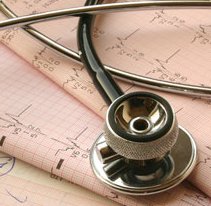Common tests for heart failure
 If you suspect you have symptoms of heart failure you should talk to your doctor (normally your primary care physician / GP).
If you suspect you have symptoms of heart failure you should talk to your doctor (normally your primary care physician / GP).
Your doctor will likely perform a thorough examination of your body and will ask you about your symptoms, your medical history and your lifestyle. It is important that you answer any questions as honestly and accurately as possible so that your doctor can make an accurate diagnosis and can work with you to find the best treatment.
If your doctor suspects you have heart failure he or she will probably suggest you have certain tests. These tests will help to show whether your heart is working properly and, if not, where the problem lies.
This section explains the tests your doctor may want you to have and what the test can show. Click on any of the tests to learn more.
The most common tests are:
- Medical history and physical examination
- Electrocardiogram (ECG)
- Blood tests
- Chest x-ray
- Echocardiogram
Additional tests may be able to find out more about your heart failure or identify the cause. These include:
- Lung function tests
- Exercise testing
- Cardiac Magnetic Resonance Imaging (MRI)
- Cardiac catheterisation and angiography
- Nuclear medicines imaging techniques
- Multi-slice Computer Tomography (MSCT)
As the symptoms presented to the doctor may vary widely between patients, you may only receive a few of these tests, and it is very unlikely you will receive all of them. If you have any concerns regarding your tests, you should discuss them with your doctor.




















